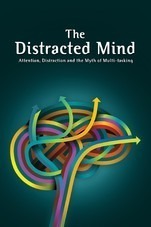Posts Tagged ‘distracted’
Raising awareness about the distracted mind (PBS special)
I feel it is critical that scientists make an effort to translate their research discoveries into a format that is understandable and meaningful to the general public. They should also, at least on occasion, step beyond detailed descriptions of laboratory results and speculate on how their findings inform the bigger picture and impact people’s lives.…
Read MoreBrain News: Lifelong Learning for Cognitive Health
Here you have the March edition of our monthly newsletter covering cognitive health and brain fitness topics. Please remember that you can subscribe to receive this Newsletter by email, using the box at the top of this page. I know I am biased — but do believe this Newsletter issue might well be our best…
Read MoreDistracted in the Workplace? Interview with Maggie Jackson around brain health at work
Today we continue the conversation with Maggie Jackson, author of Distracted: The Erosion of Attention and the Coming Dark Age. You can read part 1 here. Q — In your Harvard Management Update interview, you said that “When what we pay attention to is driven by the last email we received, the trivial and the…
Read MoreDistracted in the Workplace? Meet Maggie Jackson’s Book
Today we’ll discuss some of the cognitive implications of “always on” workplaces and lifestyles via a fascinating interview with Maggie Jackson, an award-winning author and journalist. Her latest book, Distracted: The Erosion of Attention and the Coming Dark Age, describes the implications of our busy work and life environments and offers important reflections to help…
Read MoreBrainy Haikus for brain training
Thank you to everyone who has written so many fun haikus over the summer (following the post Top 25 Brain and Mind Haikus. Yours?). These are the 10 I have enjoyed the most: (Also, Can you write a haiku describing anything crossing your mind now? Remember the simple rules: write 3 lines, which don’t need…
Read More
